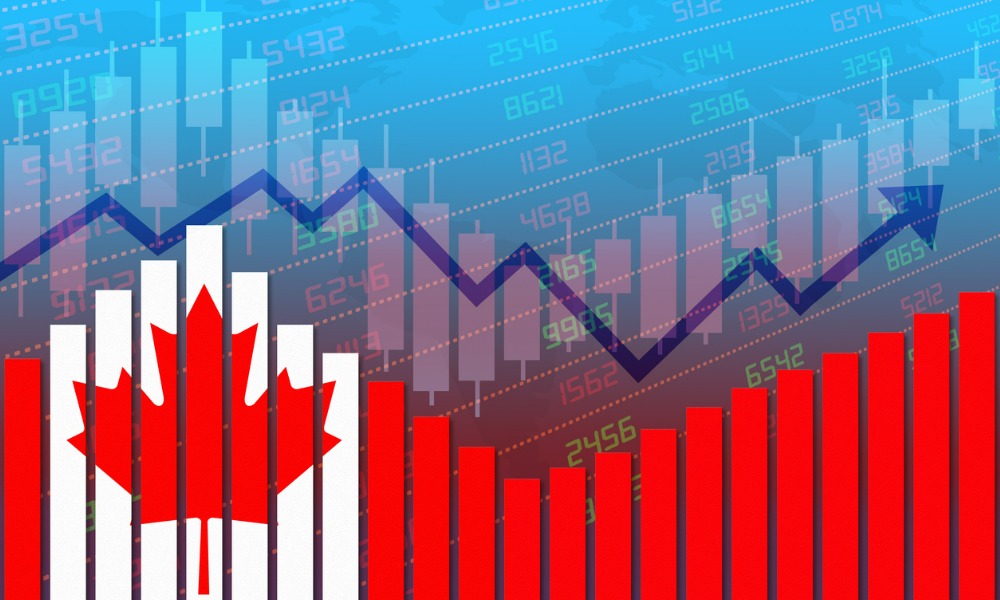BoC to announce its decision Wednesday, but how will economic data inform that?

Taken on a quarter-over-quarter basis, Canada’s economy thawed slightly in the first quarter of 2024, but the annualized stats are less favourable than economists expected.
The real GDP figures from Statistics Canada which were published Friday show a 0.4% gain for the first three months of the year, following a flat quarter at the end of 2023, revised down from 0.2%. However, the annualized rise of 1.7% for Q1 2024 was short of the 2.2% increase that was expected.
Canadian households – despite many struggling with the impact on their finances of higher interest rates - boosted the economy through services industries in the January to March period, with telecommunications services, rent and air transport leading the 0.7% overall increase in household spending. Gains for the goods sector (0.3%) was largely driven by demand for vehicles.
The household savings rate reached 6.9% in the first quarter, the highest rate since the first quarter of 2022, as gains in disposable income (+1.8%) outweighed increases in nominal consumption expenditure (+1.2%). Wages and investment income were both higher.
What about business?
Exports were weaker in Q1 2024 with a 0.5% increase compared to 0.8% in the previous quarter. Imports doubled to 0.4%.
Business investment was up for both engineering and machinery, and for inventories although the latter was at a slower pace compared to Q4 2023. Businesses also saw higher wage costs with compensation of employees up 1.5% in the first quarter of 2024, after growing 0.9% in the fourth quarter of 2023.
Overall corporate incomes fell 4.9% in the first quarter of 2024 after rising 2.4% in the fourth quarter of 2023.
Rate cuts
With the Bank of Canada poised to make its June interest rate decision on Wednesday morning and the recent narrative pointing very much to the data, does the lower-than-expected number secure a rate cut this month?
Economists at Canada’s big banks do share consensus.
RBC Economics’ Nathan Janzen points to declining per-capita GDP as a result of increased immigration, and notes that the latest GDP stats enable a rate cut this week, but things are not bad enough to demand one.
However, with inflation easing and unemployment up slightly “there is little reason for the Bank of Canada to wait longer to begin at least a gradual easing cycle and continue to look for a 25-basis-point cut to the overnight rate” on Wednesday.
Sluggish economic activity also suggests a rate cut this week, says CIBC Economics’ Katherine Judge, calling the Q1 data a “thaw not basking in the sun.” She believes Governor Stephen Poloz will announce a cut on Wednesday.
TD Economics’ James Orlando acknowledges that the markets are suggesting a June cut with a 70% chance while a July cut is fully priced in. But while he says that the BoC could go either way this week “we expect the BoC will hold rates steady [on Wednesday] and use the meeting to tee-up a rate cut in July.”
Scotiabank’s Derek Holt also believes the BoC will be more cautious and could even hold until September. “We forecast a hold and put higher odds on a cut in July—or later. Sooner and bigger cuts face higher risk of becoming policy error” he wrote in his analysis.
Finally, National Bank’s Matthieu Arseneau and Alexandra Ducharme highlighted their view that the central bank’s policy is overly restrictive but refused to be drawn into the betting game, saying only that “conditions are in place for the Bank of Canada to lower its policy rate this summer.”
Wealth Professional will bring you the latest interest rate decision this Wednesday.



